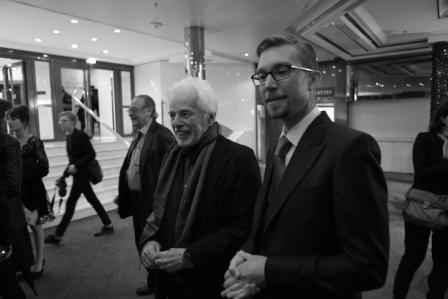"I love Jodorowsky," director Frank Pavich told me last spring at Cannes, his eyes shining with admiration. "When he wants to make a comic book, he makes a comic book. When he wants to make a painting, he makes a painting. He marches to his own drummer. His films are parallel universes. Look at Holy Mountain!"
He shook his head in wonder.
He was telling me how he, an unknown first director, came to make a documentary on the making of Alejandro Jodorowsky's ambitious 1975 film project Dune, based on Frank Herbert's science fiction novel, a project that was never realized.
"I am a fan," Pavich explained, as we shared a coffee at an outside café table. "I wrote Jodorowsky a letter, and surprise, he wrote back, and within a week I was in Paris brainstorming with him about this documentary."
Pavich quit his job in media to work exclusively on this documentary for two years. When he wants to make a documentary, he makes a documentary.

Jodorowsky and Pavich, after the premiere at Cannes
The documentary, now out in theaters in the US, was the most fun film screened at the French festival last year: It is a rollicking adventure story into how Jodorowsky conceived of his idea Dune, and the inspiring wild steps Jodo took to make it. Jodorowsky thought big. He wanted Salvador Dali in his film, so agreed to pay him $100,000 an hour. He wanted Orson Welles in his film, so agreed to get Welles, a well-known gourmand, a Michelin-star chef to make his meals on the set. He wanted Mick Jagger in the picture, and Mick said yes.
What this film becomes is a tribute to collective creativity: How when someone gets an idea and enthuses others, everyone gets going in a zany alternative universe, keyed up with imagination. Jodorowsky even got comic book designer Moebius (Jean Giraud) to make the intricate science fiction sets.
The movie moves fast with interviews with Jodorowsky and the creative geniuses he got on board, with a Mission Impossible pace of tension throughout. Would this high budget movie get made?
No. Even after Moebius had finished 3,000 storyboards, even after the extraordinary costumes had already been made, and the director was ready to shoot: The producers in Hollywood pulled out the financing.
Later, they gave the project to David Lynch, whose own uninspired rendition flopped.
"I would have cut my arms off for this project," says Jodorowsky in one interview clip.
The film is a must-see for anyone who wants to be inspired to make a creative project, and see how talented people can team up together and come . . .close. Pavich's own hand in the project is also an inspiration. It was he who was responsible for reuniting Jodorowsky and his former producer and friend Michel Seydoux, with whom Jodorowsky had not spoken since the making of Dune. The two men met on a park bench in Paris, to discuss the new documentary, and Seydoux decided to produce it.
The only downside to this energizing (and humorous) documentary is actually its high-spirited tone. Despite everything, the director insists, the making of Dune was a success, just for the joie de vivre of creativity, and did not damage the morale of the defeated artists.
A more nuanced approach to the repercussions of this failure might have made the 'take-away" more balanced.
Interviewing Jodorowsky that same week, about his new film Dance of Reality (also produced by Michel Seydoux), I learned that his experience with "Dune" must have contributed to what is now an entrenched cynicism about the money-world of Hollywood--and explains in part why, twenty-three years ago, the cult director turned to making comic books instead.
I asked Jodorowksy why his newest film, the masterpiece Dance with Reality begins with money: gold coins dropping in slow motion on a red cloth, while a voice over says: "Money is like blood. It gives life if it flows. Money is like Christ [and Buddha]. It enlightens those who use it to open the flower of the world, and damns those who glorify it, confounding riches with the soul."
"Why do I begin with money?" Jodorowsky responded with earnest. "My film begins in 1929, the time of the financial crisis, when 70 percent of Chileans were in misery. Money is important. It makes things happen."
Without a pause, he turned at once to his feelings about money and politics in the film industry.
"I am hurt by the industry. My great love is art. The film has become an industry. It's advertising, publicity. A film is nothing more than a big commercial. You see the illness of Hollywood: films have been made just to sell cigarettes. Did you see Alien, where even when there is a monster attacking, three of the characters are smoking?"
He added with strong conviction.
"They do not make pictures for the public. They make pictures to suit their genres. They like that, and we do this."
Pavich's Jodorowsky's Dune makes one wish the project had been made: It is the closest thing we have to seeing the actual want-to-be film, and as such, gives Dune the resuscitation for the public that it deserves. We catch the genius of the film in glimpses. And, under Pavich's expert novice hand, the result is quite a fun piece of entertainment.
